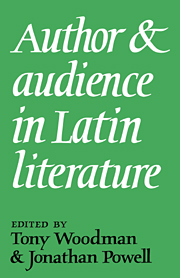Book contents
- Frontmatter
- Contents
- List of contributors
- Prologue
- 1 THE ORATOR AND THE READER: Manipulation and response in Cicero's Fifth Verrine
- 2 STRATAGEMS OF VANITY: Cicero, Ad familiares 5.12 and Pliny's letters
- 3 ‘SHALL I COMPARE THEE…?’: Catullus 68B and the limits of analogy
- 4 ATOMS AND ELEPHANTS: Lucretius 2.522–40
- 5 IN MEMORIAM GALLI: Propertius 1.21
- 6 THE POWER OF IMPLICATION: Horace's invitation to Maecenas (Odes 1.20)
- 7 THE VOICE OF VIRGIL: The pageant of Rome in Aeneid 6
- 8 FROM ORPHEUS TO ASS'S EARS: Ovid, Metamorphoses 10.1–11.193
- 9 POET AND AUDIENCE IN SENECAN TRAGEDY: Phaedra 358–430
- 10 PERSIUS' FIRST SATIRE: A re-examination
- 11 NERO'S ALIEN CAPITAL: Tacitus as paradoxographer (Annals 15.36–7)
- 12 AMOR CLERICALIS
- 13 EPILOGUE
- Notes
- Abbreviations and bibliography
- Indexes
10 - PERSIUS' FIRST SATIRE: A re-examination
Published online by Cambridge University Press: 13 March 2010
- Frontmatter
- Contents
- List of contributors
- Prologue
- 1 THE ORATOR AND THE READER: Manipulation and response in Cicero's Fifth Verrine
- 2 STRATAGEMS OF VANITY: Cicero, Ad familiares 5.12 and Pliny's letters
- 3 ‘SHALL I COMPARE THEE…?’: Catullus 68B and the limits of analogy
- 4 ATOMS AND ELEPHANTS: Lucretius 2.522–40
- 5 IN MEMORIAM GALLI: Propertius 1.21
- 6 THE POWER OF IMPLICATION: Horace's invitation to Maecenas (Odes 1.20)
- 7 THE VOICE OF VIRGIL: The pageant of Rome in Aeneid 6
- 8 FROM ORPHEUS TO ASS'S EARS: Ovid, Metamorphoses 10.1–11.193
- 9 POET AND AUDIENCE IN SENECAN TRAGEDY: Phaedra 358–430
- 10 PERSIUS' FIRST SATIRE: A re-examination
- 11 NERO'S ALIEN CAPITAL: Tacitus as paradoxographer (Annals 15.36–7)
- 12 AMOR CLERICALIS
- 13 EPILOGUE
- Notes
- Abbreviations and bibliography
- Indexes
Summary
Persius is generally taken to present greater than average difficulties of interpretation to the modern reader, and it is often said or implied that this is due to intrinsic obscurity. However, we can hardly be justified in asserting this until we have considered the question of his intended audience, and his intelligibility or otherwise from their point of view. If it appears that his original readers did not find him obscure, then we must conclude that our difficulties in reading him are due, not to any fault in him, but to the fact that we do not share his background of knowledge and ideas. If it appears that his contemporaries found him as obscure as we do, then and only then shall we be justified in condemning him to the flames for his unintelligibility, as St Jerome is said to have done.
Persius was a Roman satirist writing under Nero. What we know of his life and personality comes from the ancient biography transmitted with the text of the satires: a document which, unlike some other ancient lives of poets, bears all the marks of authenticity and accuracy. He was a young man of aristocratic Etruscan descent, with strong intellectual leanings. He belonged to the upper classes of society, mixing on companionable terms with some of the most important men in Rome, though it seems that he was rather aloof from public life.
- Type
- Chapter
- Information
- Author and Audience in Latin Literature , pp. 150 - 172Publisher: Cambridge University PressPrint publication year: 1992
- 2
- Cited by

